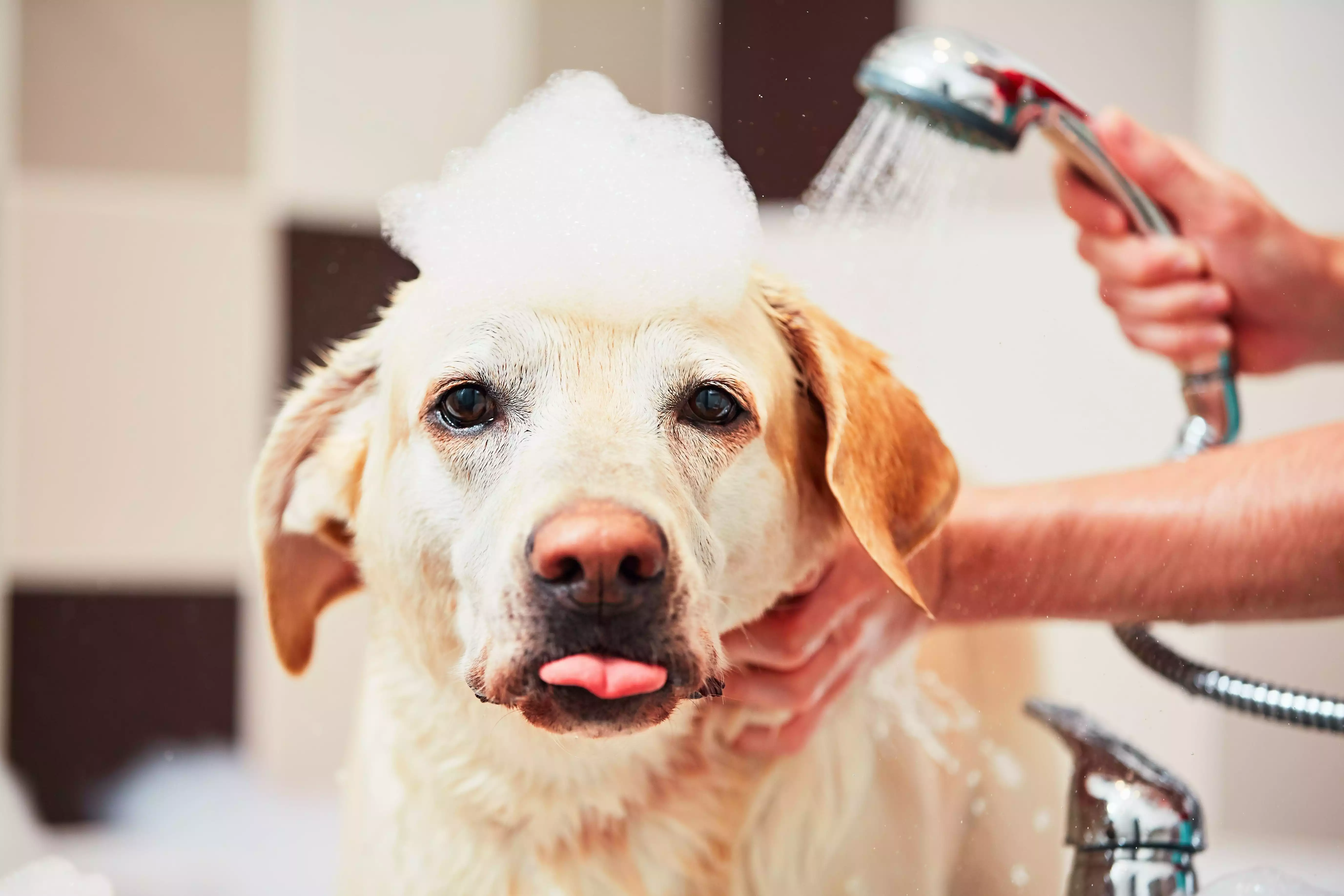
Constant itching. Painful red patches. Dry skin. We often forget about our pups skin health, but it is very important. If these conditions sound familiar, try these 11 remedies for your dog’s skin problems.
Despite having soft coats, dogs suffer from dry skin and skin-related issues nearly as commonly as humans suffer from them. In fact, the causes of dry skin are often the same across mankind and dogkind, too – including weather changes, allergies, and even fungal infections.
Understanding healthy skin is essential to caring for your pup.
Remedies to Common Dog Skin Problems
When itchy skin strikes, it can really drive your dog nuts. If left untreated, or if it becomes severe, it may even lead to hair loss, hot spots, open wounds, or skin infections.
Treating your dog’s skin problems quickly is the best way to ease his comfort and reduce the risk of side effects, but it can be difficult to figure out how to approach the average itch.
In this post, we’ll teach you a few of our favorite methods for soothing skin ouchies. And how compounded pet medications can help!
Just remember that if you’re feeling unsure about any aspect of your dog’s health, it’s better to check in with your vet before you use a fix.
1. Oatmeal Baths
If you know someone with dry, itchy skin, you may have heard of this fix before: Oatmeal baths are an old-school remedy for itchy skin that works well on all skin types (canine or human).
Grab some baby oatmeal cereal. Or, use regular, plain, unsugared oatmeal instead. Throw the mix into your food processor or blender and blend it down into a fine powder. Add the powder to a warm bath.
It’s imperative that the water is comfortably warm, yet not hot; hot water can aggravate dry skin.
Let your dog sit in the tub for at least 15 minutes to give the proteins and oils in the oatmeal powder time to soothe his skin.
Rinse him off well before letting him dash off to play again.
2. Steroids
Vets commonly prescribe steroids (like prednisone or dexamethasone) to help control your dog’s skin problems. These steroids fight inflammation leading to skin pain and itchiness.
This inflammation is often a direct result of undiagnosed allergies in dogs, especially when problems first crop up.
Dogs with acute inflammation due to allergies usually do well with a steroid injection; it lasts for several weeks. This is the easiest and fastest steroid delivery method and may be needed if your pet has chronic autoimmune issues or certain health conditions.
For some skin conditions, topical steroids are better. Your vet may direct you to apply these directly to the area all the time or only when issues crop up. The main caveat of topicals is that dogs have a tendency to want to remove them – with their tongues – causing upset tummies.
Because steroids can induce so many side effects, they should be used only when other options have been exhausted or when symptoms become severe.
Any dog on regular steroid supplementation should have frequent blood work to rule out liver damage.
3. Exercise and Play
A distracted dog is a happy dog (as long as you aren’t trying to get them to focus).
Dogs who are out walking, running, playing fetch, and enjoying time with their people are less likely to become bored and worry about their sore spots.
Exercise is critical for your dog’s health anyway, so make sure they’re getting extra attention during skin flare-ups.
Ask a neighbor, friend, or dog-walker to help out if you are having trouble fitting additional activity into your schedule.
Exercise won’t make your dog’s skin problems go away, but your well-exercised pup will sleep better despite the irritation, too.
4. Medicated Shampoos
Medicated shampoos work well for some canine skin conditions, but are especially helpful for treating hotspots.
Clipping the hair away from the sore area gives you better access before washing.
Most medicated shampoos have drying agents or antiseptics in the soaps that not only clean but also help to dry the wound up and minimize itching.
Follow all directions carefully and stop use immediately if your dog’s skin condition seems to become worse or shows signs of redness, inflammation, or ulceration.
5. Fat-Free Yogurt
Fat-free yogurt contains probiotics, and good bacteria that help to balance out your pup’s natural gut flora for better digestion and skin disease resistance.
If your dog struggles with fungal skin infections (especially yeast infections) this may help restore their skin.
Fungal skin infections are common in dogs; in fact, some diseases start as bacterial infections of the surface dermal and are later colonized by opportunistic yeasts.
Ear infections can also be fungal, causing your dog to scratch at areas around his face and ears and creating more open wounds.
These, in turn, lead to more bacterial infections, making treatment feel a bit like a vicious cycle you can never quite get a hold on.
It only takes a teaspoon or two of yogurt per day to keep your dog in balance.
The good news here is that most dogs love plain yogurt (no sugary varieties; sugar feeds yeast!).
If your dog just isn’t into yogurt, it’s okay to try probiotic-fortified foods instead. Or, consider asking the vet about probiotic supplements that are safe for dogs.
6. Diet Alterations
A lot of pet foods on the market today claim to be healthy. Few are actually balanced enough for proper nutrition.
Vitamin deficiencies lead dogs to develop nutritional dermatitis, a skin condition that closely mimics yeast and bacterial skin infections in dogs, but is really related to nutrition.
Fixing diet problems isn’t always easy, but it’s always worth a shot. Just switching up your dog’s diet may be enough of a change to eliminate symptoms.
Look for high-quality foods that list meat as the first ingredient and try to avoid or limit grains. Ask your vet about adding supplements like Omega fatty acids for additional support.
7. Vitamin E Oil
Have you ever popped open a vitamin E capsule so that you could spread the oil on your dry skin?
The same at-home remedy works well for your dog’s skin problems because they, too, require Vitamin E for skin repair.
Not only can it help your dog’s skin problems heal faster, but its moisturizing properties may also soothe dry and irritated skin spots, reducing how often he chews or licks. Your dog isn’t very likely to complain about the extra massage, either.
8. Flea and Tick Treatments
Fleas and ticks aren’t the only critters you have to worry about.
Any mite can cause your dog to itch when bitten, and an allergy to a flea or mite bite can transform little itchiness into a complete skin disaster. In the canine care world, this condition is often referred to as flea dermatitis, but really, the true name depends on what’s eating your buddy.
This one is easy to avoid.
Make sure your dog is getting regular flea and tick treatments, and only use recommended products (ask your vet about Frontline and Advantage II).
Never use cheap grocery store spot-ons, flea collars, and dollar store shampoos as many are known to cause more skin irritations. Some may even cause seizures, neurological issues, or death.
9. Benadryl
Benadryl is an antihistamine, a drug that may be helpful for dogs with intense itching.
It is especially useful for pups who are having trouble sleeping due to itching. It has the unintended side effect of relaxing via sedation – something that may be desired if your poor pup is driving himself crazy scratching.
Vets will often recommend dosing regular adult or children’s Benadryl for your dog but don’t eye out the dose or assume the same dose is accurate for your dog just because he weighs the same as your child.
Ring up your vet and ask them to give you the correct measurement to ensure you don’t over or underdose.
10. Antibiotics
Your dog’s skin problems may not necessarily begin as a bacterial infection, but open wounds caused by scratching can quickly become infected.
Your vet may recommend topical antibiotic spray and/or an oral antibiotic to clear up the infection.
While it sometimes depends on the severity of the condition, antibiotics may sometimes be available in the form of injection.
11. Compounded Medications
A lot of dogs respond very well to multiple forms of skin care treatment at the same time. So well, in fact, that most vets recommend a multifaceted treatment approach to address all canine skin concerns.
Some treatments work to reduce acute discomfort; others address the cause. In cases like these, it may be helpful to have a pharmacist who creates compounded pet medicine combine some of your medications into forms that are easier for your dog to ingest or for you to apply.
A compounding pharmacy opens up so many fantastic options.
Compounding pharmacists may be able to mix a steroid and antibiotic cream, or even create a completely new and custom-created dietary supplement instead.
Other options include adding flavorings to make your dog’s oral medications more appealing, eliminating some of the stress that comes with administering drugs.
Conclusion
Dog skin problems are one of the most common reasons for visits to the vet.
The longer they go untreated, the more likely they are to evolve from simple itchiness into open wounds.
It’s essential to visit the vet first for a proper assessment, allergy testing, blood work, or even a skin scrape to determine the cause.
Once you know the triggers to your dog’s skin problems, you’ll be able to keep your skin-care arsenal stocked with everything you need to nip these problems in the bud year-round.
And if you need more information about how Burt’s Rx can help, call today! We offer services such as pediatric compounding, compounded medication for pain management, BHRT, and dental compounding.

 info@burtsrx.com
info@burtsrx.com


